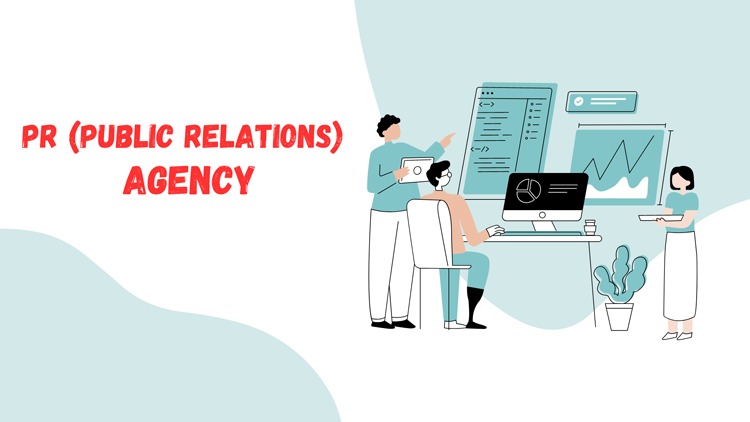- Publish on 2024-03-05 12:29:33
-

Awadhesh
- Basic
- 7 Articles
What Is a PR Agency?
A PR (Public Relations) Agency is a professional service firm that helps businesses, organizations, or individuals manage their reputation and build mutually beneficial relationships with the public, including customers, stakeholders, employees, investors, and the media. PR agencies typically offer a range of services aimed at enhancing a client's image, reputation, and visibility.

A PR (Public Relations) firm, also known as a PR agency or PR consultancy, is a professional service organization that specializes in managing the reputation and communication of businesses, organizations, or individuals. PR firms offer a range of services aimed at enhancing their clients' public image, fostering positive relationships with stakeholders, and achieving strategic communication objectives.
How PR Can Help Businesses?
PR plays a vital role in helping businesses achieve their goals, whether it's increasing brand awareness, managing reputation, driving sales, or fostering positive relationships with stakeholders. By leveraging PR strategies effectively, businesses can gain a competitive edge and thrive in today's dynamic marketplace.
- Building Trust and Credibility: PR activities such as media coverage, thought leadership articles, and community involvement can help build trust and credibility for a business among its target audience. Positive press coverage and endorsements from respected sources can enhance the reputation of a business.
- Enhancing Visibility and Awareness: PR efforts can increase visibility and awareness of a business, its products, and its services. Through media relations, social media engagement, and strategic partnerships, PR professionals can help businesses reach a broader audience and increase brand recognition.
- Managing Reputation: PR is crucial for managing and protecting a business's reputation, especially during times of crisis or negative publicity. PR professionals can develop crisis communication plans, handle media inquiries, and address issues promptly to minimize reputational damage.
- Driving Sales and Growth: Effective PR campaigns can contribute to increased sales and business growth. Positive media coverage, influencer endorsements, and targeted communication strategies can attract new customers, generate leads, and drive conversions.
- Attracting Investors and Partnerships: PR activities can help businesses attract investors, partners, and strategic alliances. A positive public image, strong brand reputation, and well-executed PR campaigns can make a business more attractive to potential investors and partners.
- Recruiting Top Talent: A positive employer brand built through PR efforts can attract top talent to a business. Employees are more likely to be attracted to companies with a strong reputation, positive culture, and meaningful social impact.
- Engaging with Stakeholders: PR facilitates effective communication with various stakeholders, including customers, employees, investors, and the community. By maintaining open and transparent communication channels, businesses can build stronger relationships with their stakeholders and foster loyalty.
- Driving Thought Leadership: PR can position key executives and subject matter experts as thought leaders in their industry. Through media interviews, speaking engagements, and content creation, PR professionals can help showcase the expertise and insights of business leaders, enhancing the company's reputation and influence.
What is a PR Team?
A PR (Public Relations) team is a group of professionals within an organization or a PR agency dedicated to managing the reputation and communication of the organization or its clients. The PR team works collaboratively to develop and execute strategic communication initiatives aimed at achieving the organization's goals and objectives.
- PR Manager/Director: The PR manager or director is responsible for overseeing the overall PR strategy and managing the PR team. They develop communication plans, set goals and objectives, allocate resources, and ensure alignment with the organization's broader objectives.
- Media Relations Specialists: Media relations specialists are responsible for building and maintaining relationships with journalists, editors, bloggers, and other media professionals. They pitch story ideas, write press releases, coordinate interviews and press conferences, and respond to media inquiries to secure positive media coverage for the organization.
- Content Creators/Writers: Content creators or writers are responsible for producing high-quality content such as press releases, articles, blog posts, social media posts, and other communication materials. They ensure that the content aligns with the organization's messaging and resonates with the target audience.
- Social Media Managers: Social media managers are responsible for managing the organization's presence on social media platforms. They develop social media strategies, create content calendars, engage with followers, monitor conversations, and analyze social media metrics to optimize performance.
PR team comprises diverse roles and skill sets working together to manage the organization's reputation, engage with stakeholders, and achieve its communication goals effectively.
Can PR Be Done in House?
Yes, Public Relations (PR) can be managed in-house by an organization's own team of PR professionals. Many businesses, especially larger ones, have dedicated PR departments or teams to handle their communication needs. Here are some reasons why an organization might choose to handle PR in-house:
- Cost-effectiveness: While hiring and maintaining an in-house PR team involves expenses, it can be more cost-effective in the long run compared to outsourcing PR to external agencies. In-house PR teams can handle a wide range of PR activities without incurring additional agency fees.
- Understanding of Company Culture and Values: In-house PR teams have an intimate understanding of the organization's culture, values, products, and services. This enables them to develop communication strategies that resonate with internal stakeholders and external audiences.
- Immediate Access to Information: In-house PR teams have immediate access to internal information, resources, and key decision-makers within the organization. This facilitates faster decision-making, responsiveness to media inquiries, and timely communication during crises or important announcements.
- Long-term Relationships with Media: In-house PR teams can build long-term relationships with journalists, bloggers, influencers, and other media professionals. These relationships can be valuable in securing media coverage, pitching stories, and managing media inquiries effectively.
- Integration with Other Departments: In-house PR teams can collaborate closely with other departments within the organization, such as marketing, sales, and customer service, to ensure consistency in messaging and communication efforts. This integrated approach can enhance the overall effectiveness of PR initiatives.
Hiring a PR Agency
Hiring a PR (Public Relations) agency can be a strategic decision for businesses looking to enhance their reputation, increase brand visibility, and achieve their communication goals.
- Define Your Objectives: Before hiring a PR agency, clearly define your objectives and what you hope to achieve through PR. Whether it's increasing media coverage, managing reputation, launching a new product, or addressing a crisis, having clear goals will help you find an agency that can meet your needs.
- Research Potential Agencies: Research PR agencies that specialize in your industry or have experience working with similar businesses. Look for agencies with a strong track record of success, positive client testimonials, and a portfolio of relevant work. You can also ask for recommendations from industry peers or search online directories of PR agencies.
- Assess Expertise and Services: Evaluate the expertise and services offered by potential PR agencies. Consider whether they have the skills and experience to handle your specific PR needs, such as media relations, crisis communication, social media management, content creation, or event planning. Additionally, inquire about their approach to strategy development, measurement, and evaluation.
Meet with Potential Agencies: Schedule meetings or calls with several potential PR agencies to discuss your objectives, challenges, and expectation
